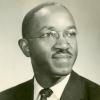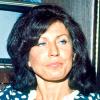Cobbloviate
The Southerner From Minnesota
The odds are that darn few Minnesota parents cast their first adoring gaze on a newborn expecting that their little bundle of joy will grow up to become a southerner, much less a larger-than-life, iconic one. Yet, by golly, that's just what happened to a Minneapolis boy born in 1922 as Lawrence Harry - but known to millions in these parts as "Larry" - Munson, whose recent passing now casts something of a pall over his beloved Georgia Bulldogs' upcoming annual tilt with archrival Georgia Tech.
After World War II, Munson used his Army discharge pay to enroll in broadcasting school but matriculated for only nine weeks or so before snagging his first radio job at tiny KDLR in Devil's Lake, North Dakota. From there he bounced around some before landing in Cheyenne Wyoming, where his new colleague, friend, and famous sportscaster-to-be Curt Gowdy recommended him to handle the University of Wyoming broadcast duties after Gowdy moved on to call minor league baseball in Oklahoma City. Like any good sports broadcaster of that era, Munson had the requisite stories about re-creating football play-by-play from tickertape, and he claimed that he got the Wyoming gig only after fabricating an audition tape of a football game between Ohio State and Minnesota, replete with canned crowd noise and special effects.
Gowdy had advised him that his best hope of making any real money lay in calling baseball games, however, and Munson made his way to Nashville in 1947, where he became the raspy voice of the Knoxville Vols and later the Vanderbilt Commodores as well. An avid outdoorsman, he also hosted "The Rod and Gun Club," which quite possibly was the first such show ever aired on local television. When professional sports burst on the scene in Atlanta, Munson appeared to get his long-sought "big break" in 1966 when he won a spot on the first broadcast team for the newly arrived Atlanta Braves. Unfortunately - or not, depending on your perspective - the Braves' egomaniacal marquee announcer Milo Hamilton soon made it plain that the booth just wasn't big enough for both him and Munson, and this stint proved to be short-lived. Just as he joined the Braves for spring training, however, Larry had learned that the longtime voice of the Georgia Bulldogs, Ed Thilenius, had taken a similar job with the fledgling Atlanta Falcons. He quickly tossed his fedora into the ring, and Georgia athletic director Joel Eaves lost little time in naming Munson to take over the responsibility of keeping the denizens of Bulldogdom informed of their team's gridiron fortunes each fall.
For the Bulldog faithful, it was not exactly a case of love at first listen. Not only was the dignified, golden-throated, and infinitely more precise Thilenius quite popular, but this was 1966, and the Civil Rights movement remained a sore spot with many white southerners who somehow still blamed the whole business on Yankee meddling. To put it mildly, it was painfully apparent from what Georgians referred to as Munson's "brogue" that he wasn't from around here. At the outset, Larry's demeanor in the booth seemed almost modeled on the detached, button-downed style of Thilenius, but, thankfully, his years in Nashville, and especially his time as Vanderbilt's broadcaster, had effectively acculturated him in some very important respects. Not the least of these was that he now understood that, far more so than anywhere else, being a college football fan in the South meant not only loving your team but hating someone else's. (The same trait, as manifested toward individual drivers is characteristic of hard-core NASCAR fans as well.) Larry acquired not just an appreciation for this feeling but the actual feeling itself during all those agonizing hours he spent giving a small long-suffering cadre of folks who actually gave a damn about Vanderbilt football a sense of how badly their beloved Commodores were getting pounded game after game, with the most painful beatings coming at the hands of a certain other Tennessee aggregation whose howling, taunting yokel fan base bedecked themselves from head to toe in traffic cone orange.
Thus it was that on the evening of Nov. 3, 1973, Larry Munson made his bones as a Georgia Bulldog and his debut as a southerner with a breathless, exultant account of Georgia's upset win over the despised Vols, topped off with "My God, Georgia has just beaten Tennessee in Knoxville!!!!" From that point on, Munson recalled, "I started hearing some things from folks… I didn't plan any of that stuff. It just came out. I was just calling what I saw and what I felt." Of course, it was not what Larry actually saw but what he so clearly and unapologetically felt for their Bulldogs that won him the hearts of the Georgia fans, and win them he most assuredly did. No Georgia fan worth his salt is without at least a tape, CD, or DVD of Munson's great calls, which, of course, are all over the internet as well. Truth be told, of course, any true Bulldog knows these calls by heart and is absolutely convinced his (and even her) imitation of Munson is absolutely spot-on. Larry probably signed as many autographs in Georgia as Herschel Walker, many of whose spectacular runs he felt required no more description than "There goes Herschel! There goes Herschel!" A reliable eyewitness account even has him being asked to lay his hands on the very pregnant belly of a sure-enough Georgia gal who wanted Larry to bless her little Bulldog-in-process.
It's fair to say that even in his prime Munson was far from the most precise and accurate play-by-play man in college football, but he was definitely your guy if you wanted somebody to make you feel that you were sitting in the stadium, so deeply committed that a Georgia loss made suicide the only reasonable option and every bit as much a part of what was happening on the field as any tackle or tight end. I doubt that Larry got many invitations to speak at pep rallies, because his ingrained, highly evolved - and, to me, utterly endearing - pessimism would've turned them into wakes. It was hard for him to envision Georgia beating, for example, a team whose offensive line outweighed our defensive guys by a good 18 ounces per man, and woe be unto our fortunes if he saw their backup punter booming them 50 yards during warm-ups. It was as if, having conditioned himself and his listeners to expect the worst, Larry gave himself - and us - reason to get really worked up if the worst was somehow averted. It was never easy, though. Even in a rare runaway, listening to Munson made you think that when the game was over, you might need a whirlpool just as much as the players did. His agitated depictions of opponents' stadia "roaring against Georgia, trying to make us drop it" made it easy to imagine the field itself actually tilted against the Bulldogs, forcing them to claw their way up a steep incline like the heroic rangers scaling Point du Huc on D-day. If some of the genius of Munson's appeal as a sportscaster was learned, some of it just plain came naturally, for he was every bit as gifted a storyteller as any southerner born and bred. If you doubt this, give a listen to this account of a calamitous bird hunting trip with his father-in-law. This is why my mama always said that she'd rather listen to Munson than watch the game on television, because envisioning the word pictures he painted with such skill and passion gave her a much more satisfying sense of what was going on. (As a side note here, one wonders whether the southern penchant for storytelling helps to explain why so many legendary sportscasters - Red Barber, Mel Allen, Lindsey Nelson, Ernie Harwell, Keith Jackson, to name but a few - hailed from below the Mason-Dixon line.)
Here it might be noted that fans' love affairs with their team's radio guy are pretty much a thing of the past now, but believe it or not, all of you young scamps out there, there actually was a time when there was only one football game available on TV each Saturday. That's not one per channel, but one per weekend, and unless your team was Notre Dame or Southern Cal or maybe Alabama, the chances that you could catch them on the tube even once a season were none too good. If you didn't have the price of the ticket or lived a far piece away, it was you and the Philco and Munson ("Hunker Down!") or his contemporaries such as John Ward at Tennessee ("Give Him Six!") or Jack Cristil at Mississippi State ("Wrap It in Maroon and White!")
One of the great things about Munson was a truly distinctive raspy growl that made it next to impossible to miss him as you inched across the dial. Your body and possessions might be in faraway, frozen Iowa, as mine once were, but your mind and emotions were focused entirely on Lexington, Kentucky, where, according to the last snippet you could tease out of all the crackling and popping on your AM dial, the "Dogs were trailing 16-14 late in the game but driving." As you agonize about the outcome, the static suddenly, magically subsides, and you hear Munson rasping, "He kicks it up, it looks good. Watch it! Watch it! Yeah, yeah, yeah, yeah! He kicked the whatchamacallit out of it!" and you know that with absolutely every scintilla of help that Larry could provide, Georgia's great placekicker Rex Robinson has gotten it done one more time. As for ol' Munson, well, once again, he hasn't simply told you about the game, he's put you there.
Larry took a good deal of flak for being a "homer," although a lot of it seemed to come from folks whose teams had a habit of losing to Georgia back in those days. As for me, I thought it was great to have an announcer who seemed every bit as fanatical and over-the-top about my team as I was. Larry demonstrated this profound attachment vividly when, in the wake of a major scandal involving a remedial studies program catering a little too much to the football team, the University of Georgia announced that its admission criteria for athletes were going to be toughened up some. This news threw Munson into such a tizzy that he went about warning booster clubs, without the slightest hint of irony, that if the faculty had their way, Georgia would soon be on the same level as Vanderbilt. Understandably, this behavior didn't sit too well with a UGA administration charged with instituting damage control on the school's academic reputation. On the other hand, it surely demonstrated that Munson's priorities were indisputably southern, even if his accent wasn't. We're going to miss you, Larry, even though we know that, from now on, you'll be hunkering down in a place that's even better than Sanford Stadium.












comments